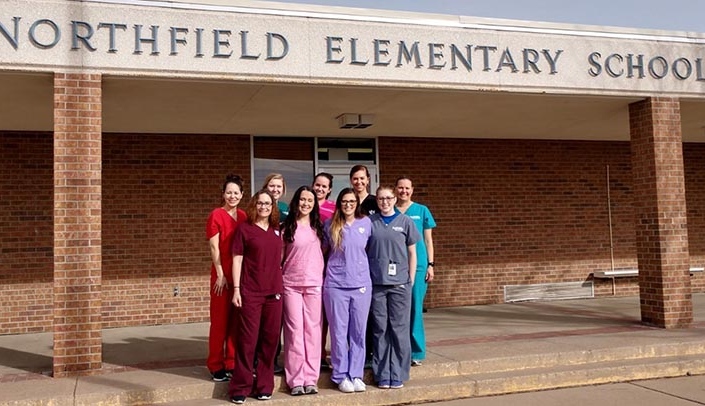Lauren McAllister has always been fascinated with teeth.
As a child, she loved brushing her teeth and relished every opportunity to pull out her siblings’ loose teeth. Now, she is close to realizing her dream of becoming a dental hygienist through the UNMC College of Dentistry’s West Division Dental Hygiene Program in Gering, Nebraska.
A western Nebraska kid since the age of 10, McAllister’s only shot at studying dental hygiene is through UNMC’s rural program. With three young children and strong family support in Scottsbluff, the program allows her to live and study in the place she calls home.
“I could not pursue this career if it wasn’t for the West Division program,” she said. “This is home and it’s forever going to be home.”
After graduation, she plans to remain in the Scottsbluff/Gering area to practice dental hygiene. It’s something many students have in common — more than 80 percent of the program’s recent graduates have remained in rural communities to start their career.
The West Division Dental Hygiene Program began the early 1990s, with the advent of distance education and technology. Since then, it has fulfilled its two-fold mission: To recruit, educate and retain dental hygienists in rural Nebraska, and to provide increased access to dental care in rural Nebraska.
“I personally could not have lived any truer to the mission of this program,” said Nicole Baker, an alum and current faculty member of the program.
A Scottsbluff native, Baker graduated from Gering High School, attended Chadron State College and graduated from UNMC in 2008. She soon joined the program as a faculty member and has taught 10 classes of dental hygiene students.
“I am so grateful for the opportunity this program has given me to become a professional dental hygienist and to teach dental hygiene education in the town I grew up in,” she said.
As the program’s first Kearney Health Opportunities Program (KHOP) student, Erica Ernst is also committed to rural dentistry. She said the dental hygiene program has instilled in her a sense of pride in serving citizens and vulnerable populations in rural communities.
“The program’s impact is a lot bigger than just two faculty members and a few students,” she said.
She pointed to examples like providing free dental care to underserved elementary school children in communities like Banner County and South Dakota’s Pine Ridge Reservation. Hygiene students also provide care at Community Action Partnership of Western Nebraska, one of the few clinics that accepts Medicaid coverage.
“Many people can’t afford to go anywhere else,” Ernst said. “Without this program, I believe the overall health of the community would go down greatly.”
